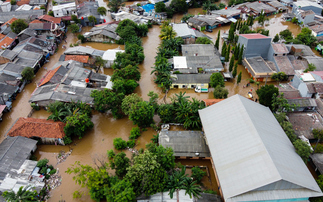Deal comes as China prepares to announce 2030 carbon reduction goal ahead of Paris climate summit
China and the European Union (EU) have this week re-newed their pledge to work together to tackle climate change, as the Asian superpower gears up to announce a target for slashing carbon emissions over the coming decades.
At a bilateral summit in Brussels yesterday, the two nations released a statement on climate change, both committing to develop low carbon technologies in order to reduce the impact of harmful greenhouse gas emissions on the environment.
China, which is responsible for nearly one quarter of the world's carbon dioxide emissions, is also expected to shortly announce how much it plans to reduce greenhouse gas emissions under a global deal that is expected to be signed in Paris at the end of this year.
Chinese Prime Minister Li Keqiang told reporters yesterday that China's target, known as an Intended Nationally Determined Contribution (INDC) in the UN jargon, would be unveiled by the end of the month. The government has already said it expects emissions to peak in 2030, but the INDC is expected to provide further information on how the economic superpower plans to deliver on the target.
Earlier this month, China's lead negotiator at the UN talks Xie Zhenhua suggested the country could mobilise $6.6tr of low carbon investment through the plan.
Yesterday's joint statement by the EU and China promises to step up co-operation on a range of green investment initiatives. They also agreed to work more closely on developing carbon markets ahead of China's plan to establish a nationwide emissions trading system by 2020.
In addition, the statement includes plans for the EU and China to work closely together on developing low carbon cities and reducing emissions from the aviation and shipping industries.
Speaking at the summit yesterday, European Commission President Jean Claude Juncker, said collaboration between the two states on climate change would be crucial to delivering a successful deal in Paris.
The EU has already pledged to slash its emissions by at least 40 per cent by 2030, compared to 1990 levels, under a Paris deal. Juncker said China's commitments showed that it was "on the same page" in terms of ambition.
"China and the European Union recognise it is not north against south, rich against poor, one country against another," he said. "It is about this generation and its responsibility for the next. It is the next generation who will deal with the consequences. It is we who must take up our duty today."
The bi-lateral partnership echoes the high profile agreement signed by Beijing and Washinston last year that saw China and the US similarly commit to working together to meet their respective emissions targets.
The bi-lateral agreements provide a further boost to hopes that an ambitious emissions reduction deal can be agreed in Paris this December.
However, United Nations secretary-general Ban Ki-Moon yesterday gave a gloomier assessment of the talks, reportedly warning the negotiations were moving at a "snail's pace".
Despite there being more than 150 days before countries meet in Paris to thrash out the final details of an agreement, there are just 10 full negotiating days left - countries will meet in Bonn, Germany in August and October for two further rounds of talks.
Moreover, many countries are still yet to formally submit their INDCs, despite initial many of the key players would have finalised thier plans during the first half of this year.
"The negotiation pace is too slow, far too slow," the Guardian reported him as saying. "It is moving at a snail's pace."
Ban's comments came at a key United Nations meeting, where Brazil, China, India and South Africa raised concerns rich countries are failing to deliver on their promise to help poorer countries tackle climate change.
Six years ago, developed nations promised to mobilise $100bn a year by 2020 for climate finance to help vulnerable nations tackle the worst impacts of warming temperatures. But poorer nations voiced fears that just a small portion of that has been raised so far.









